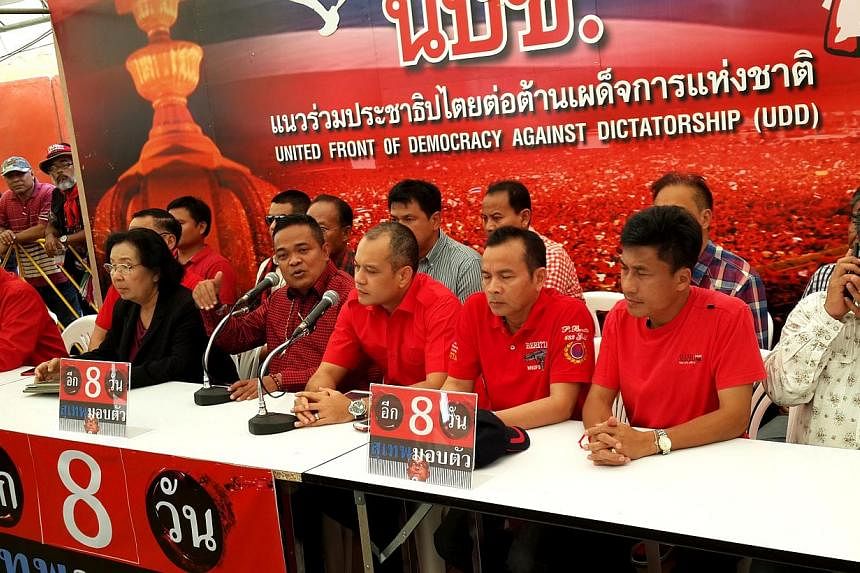The Thai army's unilateral declaration of countrywide martial law has made little difference to residents of Bangkok, who have grown resigned to the now seven-month political drama.
With the end game still not clear, it remains a waiting game - but meanwhile it's business as usual although many residents especially those in the tourism sector, are beginning to feel the pinch of a slowing economy.
There were traffic jams on Tuesday morning as some army positions were set up at strategic intersections, and the BTs "Skytrain" light rail was packed as commuters took to it, avoiding the roads.
One commuter, a female teacher, told The Straits Times: "I wish they would get it over with. This is tiring. But I am happy to see the army because it has also been scary."
 Almost weekly episodes of bombing and drive-by shootings have claimed more than 20 lives and clashes have left several hundreds injured for the past seven months of street protests that have seen the royalists People's Democratic Reform Committee (PDRC) trying to drive the tenacious government from office.
Almost weekly episodes of bombing and drive-by shootings have claimed more than 20 lives and clashes have left several hundreds injured for the past seven months of street protests that have seen the royalists People's Democratic Reform Committee (PDRC) trying to drive the tenacious government from office.
Army tanks, Humvees and trucks rolled into streets of Bangkok on Tuesday morning, setting up checkpoints and partial roadblocks that created snaking queues in various parts of the capital.
At the downtown, upscale Rachaprasong intersection, location of the Grand Hyatt and the Intercontinental hotels and major shopping malls, a single jeep with a light machine gun was parked on the sidewalk, with soldiers taking pictures of each other with their mobile phones.
One military Humvee was parked a few metres up the road leading to the headquarters of the Royal Thai Police, widely considered to be pro-government. A couple of soldiers sat on plastic chairs on the sidewalk outside the compound, whose gates were still being manned by police.
Earlier just before dawn, troops swiftly descended on several TV stations. The army has been issuing a series of orders all morning against disseminating news that would disturb national security on mass or social media.
For a brief moment, the pro-government "red shirt" TV station Asia Update was off the air, but broadcasting resumed within a couple of hours. However soldiers remained stationed at the TV networks and also at satellite company Thaicom.
Army chief Prayuth Chan-ocha has called for a meeting with permanent secretaries at 2pm local time (3pm Singapore time). In what appears to be a move to forestall unrest in other parts of Thailand, it has also called for similar meeting in the north, northeast and southern Thailand.
The caretaker Cabinet, caught off-guard by the situation, is also holding an emergency meeting on Tuesday in a "safe house", according to the National News Bureau of Thailand.
Meanwhile, protesters from both sides of the political conflict were told to stay where they were.
Anti-government protesters, who have vowed to hound the remaining caretaker ministers into resigning, cancelled planned marches.
Troops were deployed around the red shirts' rally site on the western edge of Bangkok, but the mood was calm and the soldiers were some distance from the red shirts' guards and barriers, and there was no restriction on getting in and out of the site.
There were fewer than a thousand supporters at the site in the hot mid-morning sun; numbers normally swell to a few thousands only in the evenings.
Backstage, Dr Weng Tojirakarn, one of the leaders of the red shirt's umbrella group the United Front for Democracy against Dictatorship (UDD), said: "We have to stay calm, and not give them an excuse to get rid of us. We have been getting calls all morning from our people all over the country asking what to do. Our message is stay calm."
At a press conference minutes later UDD leaders Jatuporn Promphan and Natthawut Saikua essentially repeated the same message. They emphasised that the pre-dawn declaration of martial law did not yet amount to a coup d'etat because the caretaker government was still in office.
They stressed that the army should treat both the UDD and the anti-government PDRC equally, and that appointing a new prime minister remained unacceptable.
Elsewhere, however, opinions varied.
While the army has maintained it is not launching a coup, there is still a chance it could use martial law powers to appoint an interim administration as demanded by the anti-government camp, says analysts.
Lawyer and independent commentator Verapat Pariyawong says: "The military has two obvious choices: either use this opportunity to create a secured and inclusive environment for election and reform under civilian government; or to push for a pseudo-legitimate process that replaces the caretaking government with transitional guarantees for the traditional elites."
Chulalongkorn University political science professor Pitch Pongsawat insisted that the army's imposition of martial law amounted to a coup d'etat.
"In a coup d'etat, you have to end up going to the King," he said. "This way, they don't have to do that."



